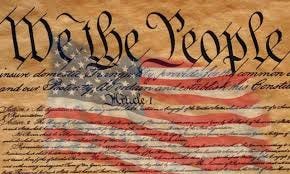Grading Government
In all the arenas of life, we give grades. School is the most obvious with a report card. Businesses regularly evaluate employee performance. In sports the scoreboard rules. In each domain, there are criteria, values, and goals which determine how a grade is assigned.
So how then do we grade government? Recent developments literally beg the question...
In a democracy “consent of the governed” is fundamental. “Promoting the general welfare” is a constitutional mandate that government provide for the health, peace, morality, and safety of its citizens. In recent years, the phrase the “common good” is emphasized as the ultimate criteria, because it demands government serve all the people.
Because of significant disagreement about precisely what these terms mean, I would like to suggest several foundational values that have stood the test of time around the world
While many of these values are rooted in the “Judeo-Christian” tradition, similar values are found in all the great religious traditions and are summarized in the “Golden Rule: “Do unto others as you would have them do unto you”. Sadly, a tarnished version is operative these days more closely approximated by “Do unto others before they do unto you.” Despite the formidable challenges, I ask how can we polish the Golden Rule.
What would it take to give our government an “A”?
1. Greater Involvement of the Governed. Consent of the governed requires involvement and dialogue between competing ideas so that the ultimate policies or laws represent the majority of citizens and work toward the Common Good. The common complaint in our country today is we need radical change; our voices are not heard. I hope that involvement whether through protest, work for a party, or supporting a cause does not wane in the coming days. The more people of all persuasions get involved and share their ideas the more likely that positive change will take place.
2. Involvement, however, is not the answer unless we address the underlying values of a society and its government. There was widespread involvement, even unanimity in Germany during the Third Reich, but the Nazi values of racial superiority were not only wrong but evil.
3. Here are the core religious values that I alluded to earlier and which I believe provide time-tested and just criteria for grading government. The test of a good government and a good society is its care for the weak, vulnerable, marginalized, and oppressed. Throughout the Bible the phrase “caring for the widow and orphan” is heard repeatedly Historically these were the most vulnerable members of a patriarchal society where one's social status was tied to marriage and men. Orphans fell outside the family structure and were outcasts. The Old Testament prophets railed against kings, religious leaders, and the nation for neglecting to care for these people. Sadly, widows, orphans, and sojourners, despite efforts in the public and private sectors, are still vulnerable and often neglected. Who else is “vulnerable” today? The mentally ill, people of a different sexual orientation, children, women, minorities, and the elderly.
4. Another group frequently used to measure a good government or just society, was the sojourner. A sojourner was a person who lived in but was not a citizen of a country. In today's terms, this would be a refugee or an immigrant. The proposed motivation to care for this group of people is rooted in the reality that Israel itself was a sojourner/immigrant/non-citizen group in Egypt for centuries and used for slave labor. The parallels to today are striking with 65 million people worldwide forced to flee their homes because of war, famine, persecution, etc.
5. The ultimate final exam Jesus describes in the Parable of the Last Judgment when he identifies the weak and vulnerable as the hungry, thirsty, stranger, naked, prisoner, and the sick.
6. While humanity has made great progress in many areas of life, we have a long way to go with these most basic human needs. Once again there is ancient wisdom as we individually and corporately, in the public and the private sectors of society, work together toward the “general welfare” and the “common good”.
The Prophet Micah asks, “What does the Lord require of us but to do justice, love mercy, and walk humbly with our God.” (Micah 6:8) The essential values are fairness and equity instituted with mercy and grace and carried out with humility. What a remarkably simple yet comprehensive process. This is not a partisan issue! It is a people issue, which calls all citizens to greater involvement, public debate, and compassionate action. Finally, remember that when we are grading our government, we the people” are grading ourselves.
Here's how President Abraham Lincoln in his second inaugural address described the homework we need to do:
“With malice toward none, with charity for all, with firmness in the right as God gives us to see the right, let us strive on to finish the work we are in, to bind up the nation's wounds, to care for him who shall have borne the battle and for his widow and orphan, to all which may achieve and cherish a just and lasting peace among ourselves and with all nations.”







